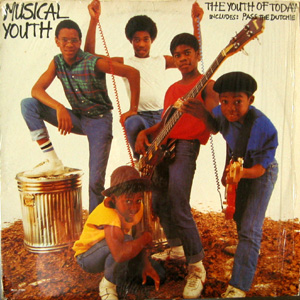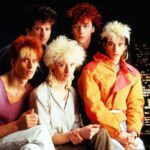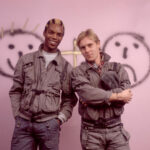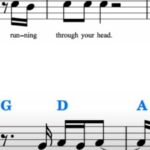Musical Youth, a British reggae band hailing from Birmingham, England, burst onto the international music scene in the early 1980s with their infectious blend of reggae, pop, and R&B. Comprised of a group of talented siblings and friends, Musical Youth captivated audiences with their youthful energy, catchy melodies, and socially conscious lyrics.
The story of Musical Youth begins in the Handsworth neighborhood of Birmingham, where the band’s founding members, the brothers Kelvin (vocals) and Michael Grant (keyboard), grew up immersed in the vibrant reggae scene of the 1970s. Inspired by the sounds of Jamaican legends like Bob Marley, Dennis Brown, and Toots and the Maytals, the Grant brothers began writing and performing their own reggae songs at a young age.
In 1979, Kelvin and Michael formed a band with their schoolmates Patrick Waite (bass guitar), Freddie Waite (drums), and Junior Waite (percussion). Drawing inspiration from their diverse musical influences and cultural heritage, they adopted the name Musical Youth, reflecting their youthful exuberance and passion for music.
Musical Youth’s big break came in 1982 when they caught the attention of record producer Bob Lamb, who was impressed by their raw talent and infectious energy. Under Lamb’s guidance, the band signed a record deal with MCA Records and began recording their debut album. In 1982, Musical Youth released their breakthrough single, “Pass the Dutchie,” a reworking of the Mighty Diamonds’ reggae classic “Pass the Kouchie.” With its catchy melody, infectious chorus, and socially conscious lyrics addressing poverty and hunger, “Pass the Dutchie” became an instant hit, topping the charts in several countries and catapulting Musical Youth to international fame virtually overnight. Following the success of “Pass the Dutchie,” Musical Youth released their debut album, “The Youth of Today,” later that year. The album, featuring a mix of original songs and cover versions of reggae classics, received favorable reviews from critics and further solidified the band’s status as rising stars in the music industry. However, Musical Youth’s meteoric rise to fame was not without its challenges. The band faced criticism and controversy over the lyrics of “Pass the Dutchie,” which some interpreted as promoting drug use. In response, Musical Youth clarified that the song’s lyrics were actually about sharing food, not marijuana, and emphasized their commitment to spreading positive messages through their music. Buoyed by the success of “Pass the Dutchie,” Musical Youth embarked on extensive tours across the United States, Europe, and beyond, sharing the stage with renowned artists and bands such as Madness, UB40, and The Police. Their electrifying live performances, marked by infectious grooves and energetic dance moves, endeared them to audiences of all ages and backgrounds, cementing their reputation as one of the premier live acts in the reggae-pop genre. In addition to their own headlining tours, Musical Youth also collaborated with other artists and bands, further expanding their reach and influence. They contributed tracks to numerous reggae compilations and soundtracks, sharing the spotlight with legends like Bob Marley, Peter Tosh, and Jimmy Cliff. As the years passed, Musical Youth continued to evolve and experiment with their sound, incorporating elements of pop, R&B, and dancehall into their music. Their sophomore album, “Different Style!,” released in 1983, showcased a more polished and mature sound, with slick production and infectious hooks. Tracks like “Never Gonna Give You Up” and “She’s Trouble” demonstrated the band’s growth as songwriters and musicians, earning praise from fans and critics alike. Subsequent albums, including “Anthology: 21st Anniversary Edition” (2002) and “When Reggae Was King” (2007), further solidified Musical Youth’s reputation as innovators in the reggae-pop genre. From the smooth R&B of “Heartbreaker” to the upbeat ska-pop of “Let’s Go to the Moon,” each album showcased the band’s musical versatility and penchant for catchy melodies and memorable hooks. Today, Musical Youth stands as one of the most beloved and enduring bands in the reggae-pop genre. With over four decades of music-making under their belts, they have inspired countless fans and influenced scores of aspiring musicians with their infectious grooves, positive messages, and unwavering commitment to their craft. Moreover, Musical Youth’s legacy extends beyond their music, encompassing their role as cultural ambassadors for reggae music and advocates for social change. Through their music, activism, and community engagement, they have left an indelible mark on the world of music and beyond, inspiring future generations to dance, sing, and strive for a better world.Musical Youth’s journey from a group of friends jamming in a basement to international reggae icons is a testament to the power of passion, perseverance, and positivity. As they continue to delight audiences with their infectious rhythms and uplifting messages, Musical Youth remains a shining example of the transformative power of music and the enduring spirit of the reggae-pop movement.
This post has already been read 81 times!










